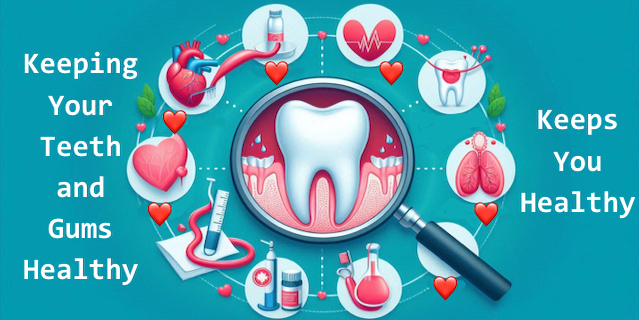It’s like your dentist always says, brush and floss your teeth! Tooth care is not only about a bright smile and reduced cavities. It is also a way to prevent several chronic diseases, including periodontal disease (PD).
Research has found associations between periodontal disease and several chronic illnesses. So what is periodontal disease?
Periodontal Disease
Your mouth has a microbiome, a group of around 2000 bacteria, fungi, viruses, archaea and protozoa, that live there, helping in digestion, and supporting the immune system by destroying harmful germs. When an imbalance occurs in this microbiome, the symbiotic relationship can be disrupted and beneficial activities can shut down.
This disarrangement in the microbiome is part of the process of developing PD. PD is a progressive, multi-factored, condition that starts with gingivitis. Plaque that accumulates on teeth can lead to gingivitis, a reversible inflammation of gums and tissue around the teeth. Unfortunately, untreated gingivitis will progress to the irreversible inflammation of the gums, bones, cementum, periodontal ligaments and finally tooth loss that is PD. [1]
Periodontal Disease and the Heart
Evidence has ballooned implicating PD in the development of cardiovascular disease. There are several proposals for the mechanisms of the periodontal-cardiovascular connection. For example, research has discovered inflammatory factors like interleukin-1β, interleukin-6, tumor necrosis factor-α, and C-reactive protein in the blood stream of people who have early PD.[1] Some believe that pro-inflammatory bacteria from PD move from the mouth to the cardiovascular system and directly impact it. Another proposal is that the chronic inflammation that is PD can indirectly and negatively impact heart and blood vessels. The response of the immune system to periodontal bacteria also negatively effects blood pressure. In fact, studies have found a correlation between periodontitis and endothelial dysfunction which was discussed in the recent post “Erectile Dysfunction: Saturated Fats Can Ruin Your Sex. “[1]
Evidence even associates periodontal disease with heart failure and atrial fibrillation. For example, structural changes in the heart (called atrial fibrosis) have been associated with periodontal disease. [ 1]
Periodontal Disease, Cavities, and Diabetes
Beyond PD, cavities are a problem. Cavities or what your dentist calls dental caries are caused primarily by Streptococcus mutans, a bacteria that produces acid from sugars. This acid takes away the minerals of the teeth (demineralizes) producing the holes that we know as cavities. The normal microbiome on the teeth change to primarily Streptococcus mutans with the consumptions of sugars. [2]
Cavities have been linked to high blood pressure in one case-control study. The research found that the biochemistry of the mouths of those with cavities correlated with some of the activating biochemical changes that occur in the vascular endothelium. [2]
Diabetes is also associated with cavities and PD.[3] In fact, there is strong evidence for increased risk for diabetic complications in diabetics with PD: Risks for diabetic retinopathy (separation of the retina from the back of the eye causing blindness), neuropathy (nerve condition causing pain, tingling, muscle weakness), kidney problems, cardiovascular complications, and death were reported for people with diabetes who also had periodontitis compared to those with diabetes who did not.[4]
Periodontitis and Cancer
Chronic inflammation and the microbiome/microenvironment have been implicated in enhancing the potential of cancer. Epidemiological surveys have linked periodontal disease and microorganisms that can cause harm under certain conditions. Research has also found that, in people with periodontitis, the bacteria and the toxins produced by the disease are in contact with the circulatory system by way of their inflamed gums. Those bacteria and toxins travel into the gastrointestinal tract. But they also can translocate to other body parts because of the changes in the mucus barriers of the gums and bacterial load of periodontal disease. [5]
Between 15% and 20% of all cancers are associated with microorganisms. For example, some tumor promoters are helicobacter pylori in stomach cancers, human papillomavirus (HPV) in cervical and head/ neck cancers, and hepatitis B/C virus (HBV/HCV) in liver cancers. One cohort study of nearly 20,000 male never smokers found a 2.3-fold increase in the risk of oropharyngeal cancer in those with periodontal disease.[5]
What Should You Do?
You’ve heard it for years but brushing and flossing your teeth is important. Seeing a dentist twice a year to have your teeth cleaned and your mouth treated for inflammation must be part of your routine.
And let other people know. Awareness of periodontal disease can help others. Share this on social media!
References:
1.Altamura, S. et.al. Oral health as a modifiable risk factor for cardiovascular diseases. Trends in Cardiovascular Medicine. 34(4) 2024. 267-275. doi.org/10.1016/j.tcm.2023.03.003
2. Sabharwal, A., Stellrecht, E. & Scannapieco, F.A. Associations between dental caries and systemic diseases: a scoping review. BMC Oral Health 21, 472 (2021). https://doi.org/10.1186/s12903-021-01803-w
3. Chang, Y., Lee, J.S., Lee, KJ. et al. Improved oral hygiene is associated with decreased risk of new-onset diabetes: a nationwide population-based cohort study. Diabetologia 63, 924–933 (2020). https://doi.org/10.1007/s00125-020-05112-9
4.Nguyen, A. et.al. The association of periodontal disease with the complications of diabetes mellitus. A systematic review. Diabetes Research and Clinical Practice 165. 2020. doi.org/10.1016/j.diabres.2020.108244
5. Baima, G. et.al. Periodontitis and risk of cancer: Mechanistic evidence. Periodontology 2000. 2023;00:1–12. DOI: 10.1111/prd.12540






